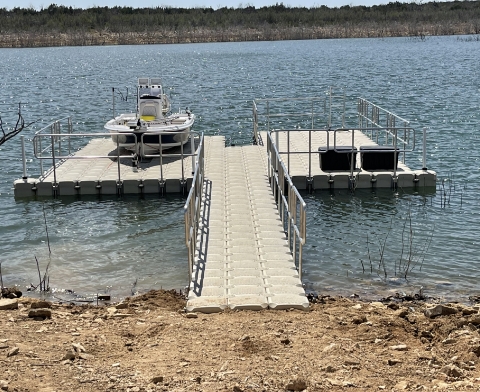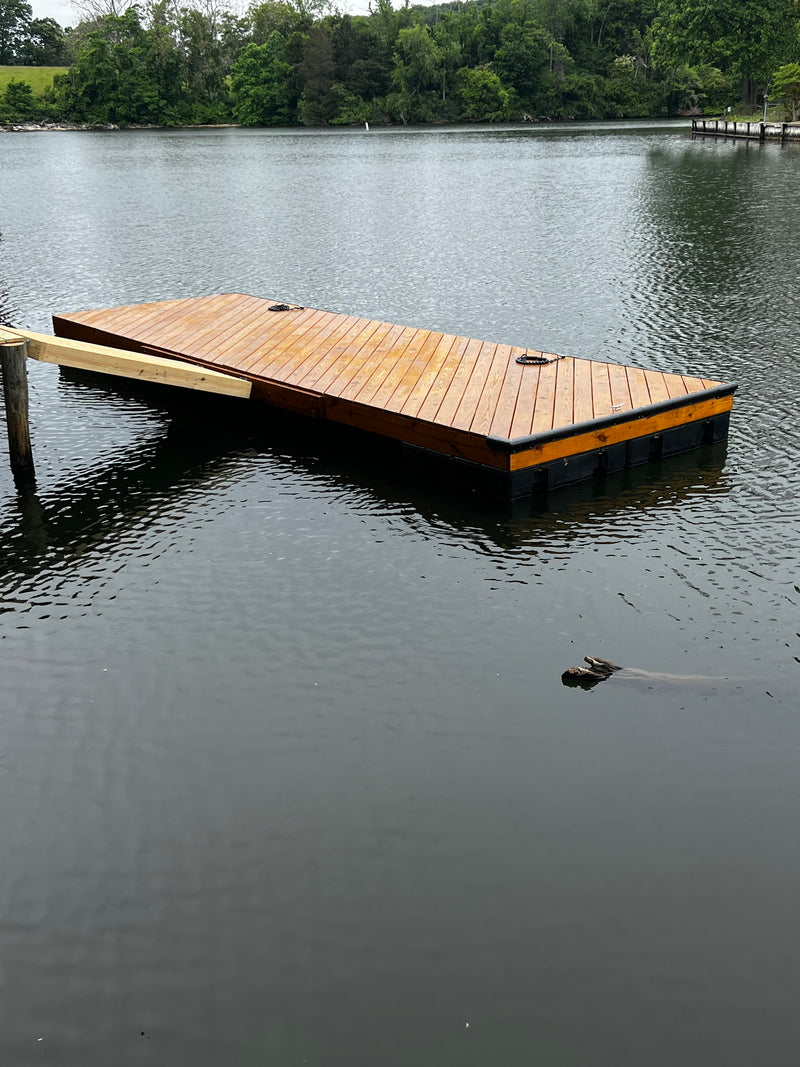Advantages of Working with a Developed Floating Dock Company for Comfort
Advantages of Working with a Developed Floating Dock Company for Comfort
Blog Article
Develop the Perfect Docking Solution With Floating Docks
Floating docks present a functional solution for a selection of maritime demands, adapting effortlessly to changing water degrees and diverse vessel kinds. As we check out the necessary elements that contribute to the performance of floating docks, several key variables concerning security and maintenance will arise, increasing questions concerning how to enhance your docking experience.

Benefits of Floating Docks
Floating docks offer various benefits that make them a perfect selection for various maritime applications. Unlike taken care of docks, floating docks surge and loss with the tide, making sure consistent access for vessels.
Additionally, floating docks are typically less complicated and quicker to mount compared to standard set structures. Their modular design permits straightforward setting up and disassembly, helping with maintenance and relocation when necessary. This versatility is especially helpful for short-term applications or in atmospheres where problems may change.
Floating docks also have a tendency to be more eco pleasant, as they decrease disruption to the seabed and surrounding water communities. Their resilient nature minimizes the danger of damage to aquatic life, promoting a healthier environment. Moreover, these docks can be tailored to fit different vessel dimensions, guaranteeing that they satisfy certain functional demands - floating dock services.
Ultimately, the combination of flexibility, convenience of installation, and environmental factors to consider makes floating docks a very efficient solution for a variety of maritime needs.
Selecting the Right Materials
Selecting the ideal products for floating docks is critical to make sure stability, resilience, and longevity. The selection of products directly impacts the dock's efficiency in different environmental conditions, consisting of direct exposure to water, sunlight, and potential wear from marine website traffic.
Usual products used for floating docks consist of light weight aluminum, timber, and high-density polyethylene (HDPE) Light weight aluminum is light-weight, corrosion-resistant, and calls for marginal maintenance, making it an exceptional option for longevity. Its first expense can be greater compared to various other products.
Timber, while cosmetically appealing and supplying a conventional look, can be at risk to rot and bug damage if not correctly dealt with. As a result, utilizing pressure-treated wood or normally durable types like cedar or redwood can reduce these issues.
HDPE is a preferred selection due to its resistance to UV rays and chemicals, in addition to being eco-friendly. floating dock company. It is available and light-weight in numerous shades, enabling customization
Ultimately, the best material option will depend upon particular needs, consisting of spending plan, wanted appearances, and ecological factors to consider. Mindful evaluation of these elements will lead to a effective and resistant floating dock service.
Design Considerations for Security
When designing floating docks, guaranteeing security is a fundamental element that can significantly impact their performance and safety and security. Stability in floating dock design is influenced by various variables, including buoyancy, weight distribution, and the plan of elements.
Weight distribution is critical; equally distributing loads throughout the dock stops turning and improves stability. This can be attained with critical positioning of docking equipment, such as fenders and cleats, along with correct spacing of floats. Furthermore, the dimensions of the dock should be attentively prepared. Bigger styles can provide boosted stability, specifically in harsh water conditions, while longer docks might call for additional assistances to protect against sagging.
An additional key factor to consider is the ecological influence, consisting of wave activity and wind. Incorporating attributes such as sidewalls or skirting can assist mitigate the effects of ecological pressures, preserving security in damaging conditions. Inevitably, a mix of thoughtful design, material selection, and understanding of ecological aspects will produce a drifting dock that meets both stability and safety requirements.
Setup Tips and Strategies

Next, safeguard the essential permits and abide by local policies, which might determine installation techniques and ecological considerations. If called for, engage a certified contractor experienced in floating dock installments. Usage top quality materials designed for marine settings to boost resilience and longevity.
When positioning the dock, straighten it alongside the coastline to assist in simple access. Make certain that the anchoring system is durable, using concrete blocks or helical anchors to maintain the dock against wind and wave activity. It's essential to make up seasonal water level fluctuations, including possible ice movement in chillier climates.
During the setup, ascertain the dock's floatation and stability prior to completing the anchoring. Regularly evaluate the installation for any kind of indications of wear or damages. By adhering to these ideas and techniques, you can accomplish a protected, functional, and aesthetically pleasing floating dock installment that meets your needs.
Maintenance and Treatment Standards
Maintaining and caring for floating docks is crucial to extending their life-span and making sure safe use. you can try this out Regular inspections should be performed to identify any kind of indications of wear, damages, or aquatic development. Try to find fractures, loosened fittings, or blemished areas on the dock's surface, as these concerns can endanger structural honesty.
Cleaning up is important. Make use of a pressure washing machine to remove algae, barnacles, and debris, which can accumulate with time. For stubborn growth, take into consideration environmentally friendly cleaner that will not harm water life.
Additionally, examine the mooring lines and supports often to ensure they are free and safe from deterioration. Change any torn or harmed lines promptly to keep security.
Throughout extreme weather, such as tornados or freezing conditions, take precautionary procedures. click this link Secure the dock with additional mooring lines and, if possible, get rid of any kind of detachable components to stop damage.
Conclusion
Finally, the execution of floating docks offers a reliable and versatile docking remedy ideal for various maritime applications. Their flexibility to changing water degrees, combined with a modular style, enables very easy modification and moving. Choosing ideal products improves both sturdiness and aesthetic appeal, while cautious factor to consider of stability ensures safety and security and long life. With appropriate installment and regular upkeep, floating docks can supply effective and trusted docking experiences for a large range of vessels.
As we explore the important components that add to the performance of floating docks, several vital elements pertaining to stability and upkeep will arise, raising concerns about just how to optimize your docking experience. Unlike dealt with docks, floating docks surge and autumn with the tide, making sure consistent ease of access for vessels.When developing floating docks, guaranteeing stability is a fundamental aspect that can significantly affect their capability and safety. Stability in floating dock design is influenced by numerous aspects, including buoyancy, weight circulation, and the plan of parts. Inevitably, a combination of thoughtful style, material choice, and understanding of environmental factors will certainly yield a drifting dock that meets both security and safety and security requirements.
Report this page